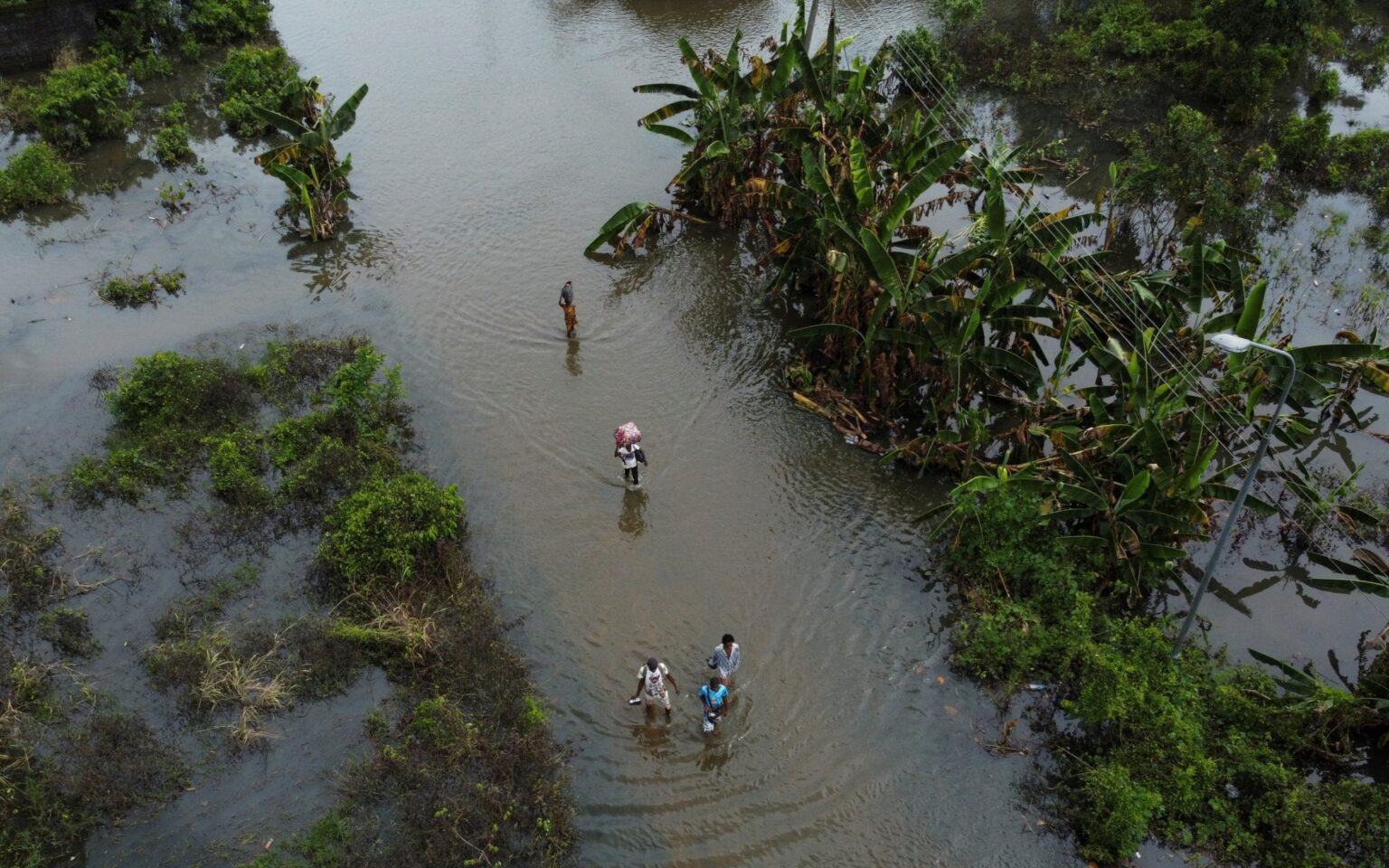- Climate Change-related flooding saw large swathes of farmlands and settlement areas in Nigeria’s coastal Niger Delta flooded by December 2022.
- Boko Haram terrorists, bandits, and armed herders have forced at least 78,000 farmers to abandon their farmland.
- Over the past eight years, an estimated 6,000 Benue people reported killed while two million farmers were displaced.
Nigeria is battling a perfect storm with a double whammy of climate change and conflict exacerbating the country’s food crisis. Currently an estimated 25.3 million people in Nigeria are facing food crisis partly worsened by the ongoing flooding throughout the country.
As of December 2022, large swathes of farmland and settlements in Nigeria’s coastal Niger Delta region flood. The flooding saw the closure of schools, leaving hundreds of children out of learning centres as the disaster took a toll.
Climate change worsening Nigeria’s food crisis
Nigeria, which with 222.2 million people is Africa’s most populous nation, is struggling to adapt to a changing climate. Natural disasters are increasingly taking a toll on its children, as millions stay out of school. According to Unicef, an estimated 18.5 million children were not in school even before the floods hit. Unicef attributed the dire situation to continued instability and insecurity driven by jihadists and criminal gangs.
The United Nations’ Food and Agriculture Organization says rising waters are not the only thing to blame for the food crisis gripping Africa’s largest economy.
Already, over 5.9 million children in northwest and northeast Nigeria were facing acute malnutrition in the 12 months to April 2023. A total of 1.6 million children are under severe acute malnutrition.
As of last year, Nigeria ranked 107 out of 113 countries that were rated for food security on the 2022 Global Food Security Index. The index ranks countries based on food affordability, availability, quality, and safety and since 2021, Nigeria has slid further down the list dropping down from its previous rank of 97 in 2021.
Terrorism, floods causing food crisis
According to Muhammad Abubakar, Nigeria’s Minister of Agriculture and Rural Development, terrorism and floods are the main causes of food insecurity in Nigeria.
Nigeria’s economy has made headlines in the last few years driving the country’s growth. However, the oil sector employs a small group of Nigerians, and the larger portion of Nigerians work in the agriculture sector.
It s estimated that approximately two-thirds of Nigeria’s labour force is dependent on agricultural activities including farming and herding.
However, Nigeria’s agriculture is rainfed, leaving millions of farmers vulnerable to adverse weather. This implies that 75 per cent of one of Africa’s populous country, rely on weather patterns for food leaving them exposed climate crisis.
“Nigeria is one of the most vulnerable countries to the effects of climate change and natural hazards. It has experienced a variety of climate disasters, including rising temperatures, gully erosion, drought, and increased flooding,” FAO explains.
Insurgency worsening Nigeria’s food crisis
“In 2022, Nigeria was hit by devastating floods that killed more than 500 people, displaced more than 1.4 million, and destroyed about 90,000 homes,” reports the World Weather Attribution Group.
Floods have destroyed thousands of hectares of farmland in Nigeria, worsening an already severe food situation. In 2022, floods destroyed thousands of farmlands in Nigeria, costing the agricultural sector millions of dollars in damages.
On the flip side of things, you have draught in the northwest and northeastern parts of Nigeria further exasperating food insecurity in the country.
Read also: Data Vs Floods: Safeguarding Africa’s development
Authorities in Nigeria’s predominantly Muslim north are fighting Boko Haram, an Islamist militant group based in northeastern area. Boko Haram is also casing chaos in Chad, Niger, parts of Cameroon, and Mali.
Armed groups such as Boko Haram extremist group are responsible for ongoing violence. Resultant banditry and kidnappings are further complicating food security in the country.
Boko Haram insurgency
The report said already armed herders, bandits and Boko Haram terrorists have left about 78,000 displaced from their farms.
The insurgents attack nomadic groups, robbing them of their herds, and pushing them further South. This, however, presents a challenge as farmers in the South compete for limited land for cultivation and pasture.
“Although ethnicity and religion play a role in the conflict, many of the herders are Fulani Muslims while the farmers are Christian and from other ethnic groups, climate change is exacerbating it.”
Two million farmers displaced in Nigeria
“Over the past eight years, an estimated 6,000 Benue people have been killed and two million farmers have been displaced. The violence has largely disrupted the food supply chains between northern and southern Nigeria. Many roads are too unsafe for farmers to transport their crops,” the report notes.
So what is Nigeria doing to address this food crisis and the causing factors, violence, and climate change? Nigeria’s new President Bola Tinubu seeks to resolve conflict between farmers and herdsmen in the country.
Read also: Africa: Climate change effects worsen agricultural output, food security
So now the government is working to build what it describes as agricultural hubs. These are special production areas that get subsidies to enhance productivity. Th agricultural hubs have modern storage facilities to reduce post-harvest waste.
Inflation elevated in Nigeria
The roiling food crisis in Nigeria has also found an unlikely ally in inflation. In March, Nigeria’s inflation hit nearly 18-year high, piling pressure on policymakers to tackle the situation. The inflation hit 22.04 per cent in March up from 21.91 per cent in February, shaving people’s savings.
Former President Muhammadu Buhari considerably pushed back the insurgents, but more needs to be done. While the move is commendable, more strategies are needed to address the food crisis. By tackling extremists, Nigeria will see millions of children back in school even as farmers go back to their farms.
While the country is rich in oil, strategic planning with a focus on further developing agriculture is critical.




